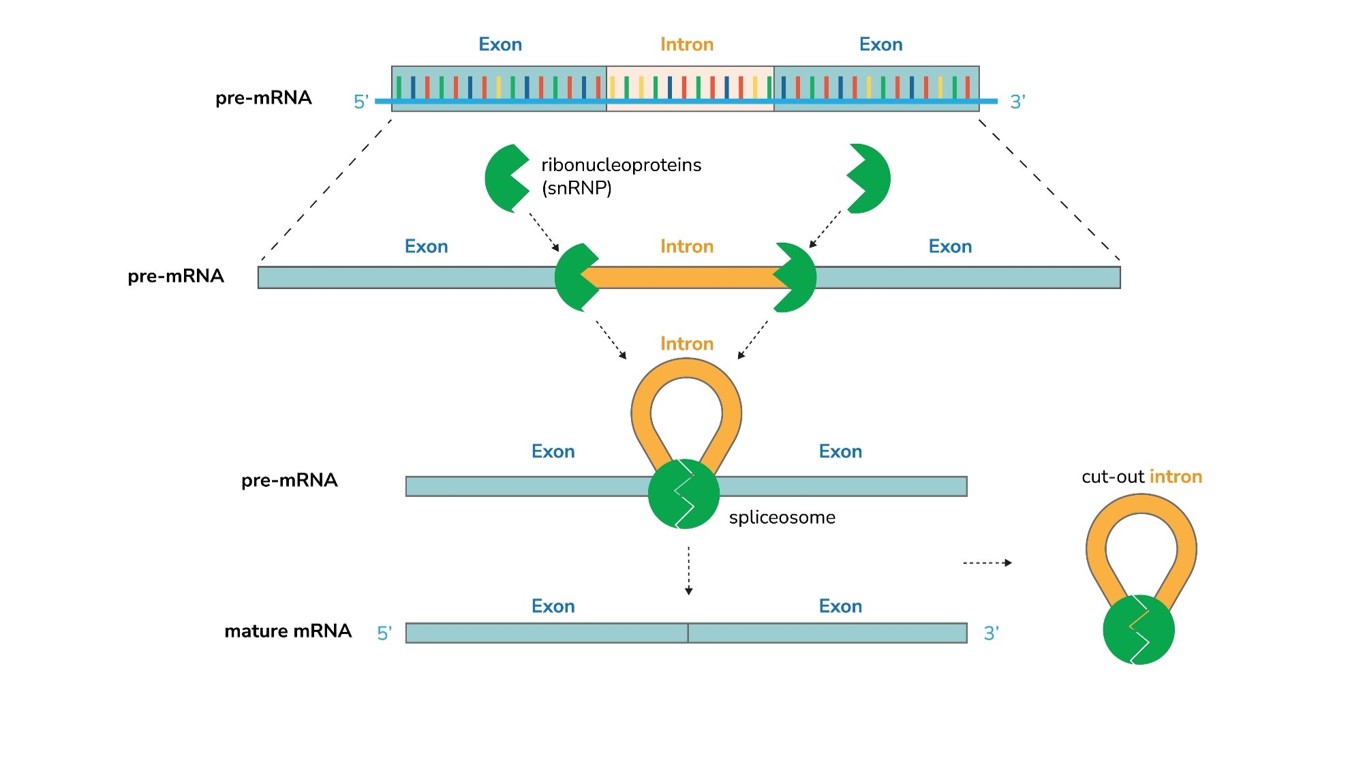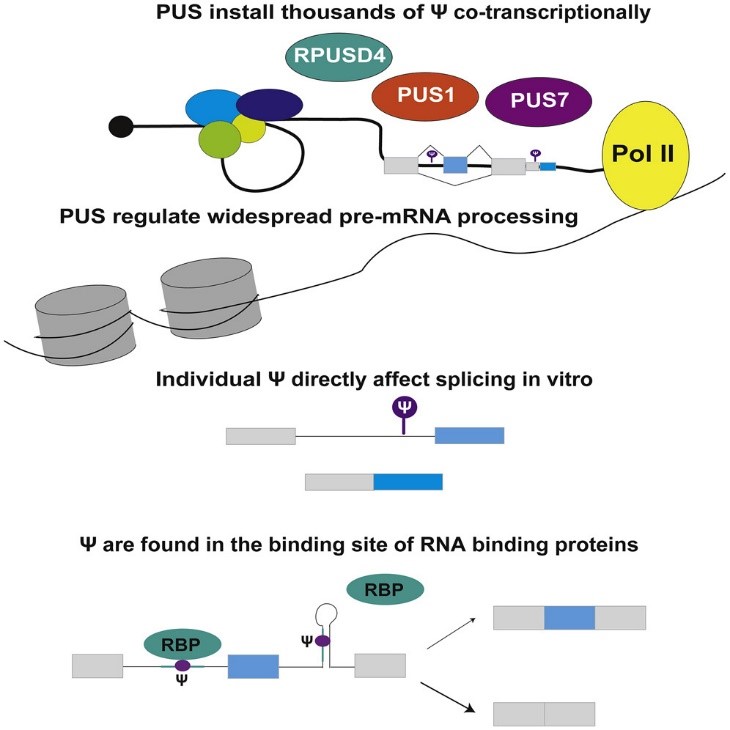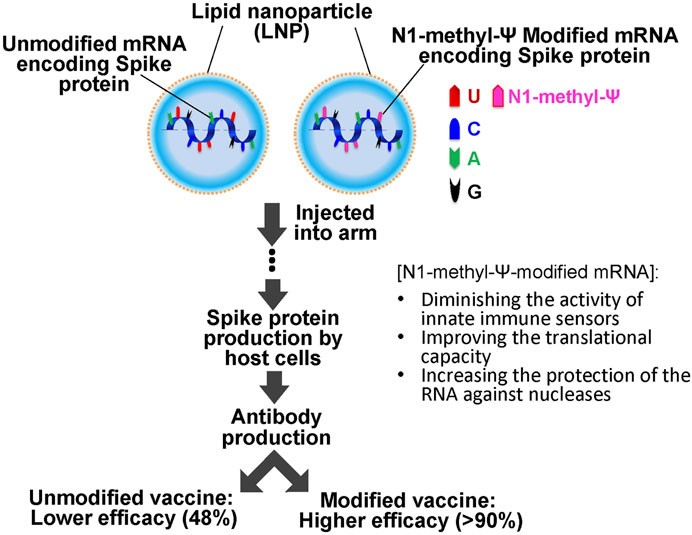mRNA
Messenger ribonucleic acid (mRNA) is a single-stranded RNA molecule that corresponds to the genetic sequence of a gene and is read by the ribosome during protein synthesis. mRNA is produced during transcription, first RNA polymerase converts the gene into a primary transcript mRNA (precursor mRNA) containing introns and does not encode the final amino acid sequence. Subsequently, the mRNA precursor undergoes a series of processing and modification steps, including splicing, 5' end-cap structure addition (capping), 3' end-polyadenylation, and pseudoUridylation to form the mature mRNA. ultimately, the mature mRNA serves as a template for protein synthesis and participates in the ensuing protein translation process.
 Figure 1. Process of RNA splicing.
Figure 1. Process of RNA splicing.
PseudoUridine Modifications in mRNA
Pseudouridine is a modified nucleotide that is ubiquitously present in human mRNA and is dynamically regulated. Pseudouridine modification is achieved through an enzyme-catalyzed reaction that converts uridine (U) to pseudouridine (Ψ). PUS1, PUS7 and RPUSD4 are tissue-specific pre-mRNA-modifying pseudouridine synthases that recognize specific sequences or structures in the mRNA molecule and catalyze the isomerization of uridine to form pseudouridine.
 Figure 2. Pseudouridine modification of pre-mRNA during processing. (Nicole, M, M.; et al.2022)
Figure 2. Pseudouridine modification of pre-mRNA during processing. (Nicole, M, M.; et al.2022)
- Biological Function of PseudoUridine Modifications in mRNA
- Alters and improves the stability of the secondary and tertiary structure of mRNA, protects mRNA from degradation by nucleases, and improves the efficiency of transcription and translation.
- Dynamically regulates pre-RNA processing, which can turn on the splicing process and regulate the generation of splice products, and further affects the accuracy and efficiency of splicing.
- Regulates the rate and accuracy of the translation process of mRNA, which further affects the efficiency and correctness of protein synthesis.
- Affects the interaction between mRNA and other biological macromolecules such as binding proteins. Modification of pseudouridine changes the structure, affinity and surface properties of mRNA, which can further affect the interaction with other biomolecules.
Pseudouridine Modifications of mRNA in Vaccine R&D
Pseudouridine modifications of mRNA play an important role in vaccine development.
- Immune enhancement - Studies have shown that by introducing pseudouridine modifications in mRNA, the stability of vaccine mRNA can be enhanced and its presence in vivo prolonged, thus improving the immune effect of the vaccine.
- Immune response modulation - In vaccine development, by precisely regulating the translation rate of mRNA, the expression level of vaccine protein can be optimized, thus enhancing the effect of immune response.
- Safety - Pseudouridine modification can enhance the structural stability of mRNA and reduce its susceptibility to enzymatic degradation, thereby increasing the stability and long-term shelf life of vaccines. This is critical for vaccine preparation, storage and distribution.
- Anti-mutagenic - Pseudouridine modifications can increase the anti-mutagenic properties of vaccine mRNAs, giving them more broad-spectrum protection. By introducing pseudouridine modifications to the mRNA sequence, the impact of viral sequence variation on vaccine efficacy can be reduced.
 Figure 3. Schematics of SARS-COVID 19 mRNA vaccination. (Pedro, M.; et al. 2021)
Figure 3. Schematics of SARS-COVID 19 mRNA vaccination. (Pedro, M.; et al. 2021)
Pseudouridine modified mRNA is the key to the licensed mRNA vaccine developed by Moderna and Pfizer-BioNTech, which has been very successful in the SARS-CoV2 vaccine. In addition, there are bright potential prospects for the development of vaccines related to cancer, immune diseases, infectious diseases and neurological disorders.
References
- Nicole, M, M.; et al. Pseudouridine Synthases Modify Human Pre-Mrna Co-Transcriptionally And Affect Pre-Mrna Processing. Molecular Cell. 2022, 82(3): 645-659.
- Pedro, M.; et al. The Critical Contribution of Pseudouridine to mRNA COVID-19 Vaccines. Epigenomics and Epigenetics. 2021, 9.
